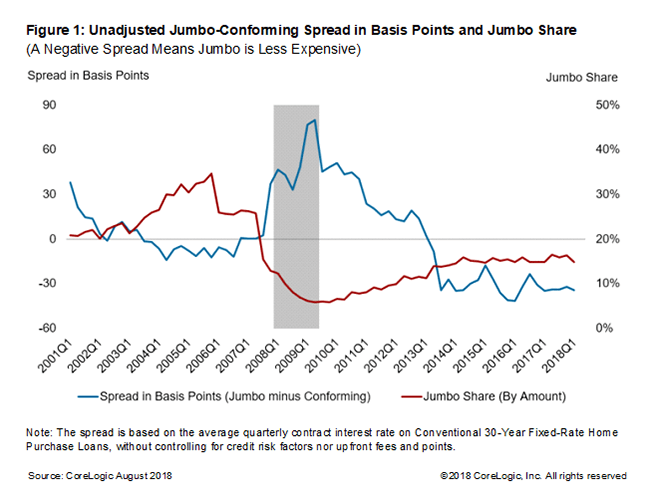Comprehending Jumbo Loan: What You Need to Know for Luxury Home Purchases
Comprehending Jumbo Loan: What You Need to Know for Luxury Home Purchases
Blog Article
Navigating the Jumbo Financing Landscape: Necessary Insights for First-Time Homebuyers
Navigating the complexities of jumbo car loans presents a special set of challenges for novice buyers, especially in an advancing real estate market. Understanding the necessary eligibility needs and possible benefits, together with the drawbacks, is vital for making informed choices. In addition, creating a solid financial strategy can considerably enhance your leads. Involving with professionals in the area can light up paths that might initially seem discouraging. As you check out these details, it becomes clear that a much deeper understanding can disclose opportunities that could otherwise be overlooked. How can you finest placement yourself for success in this specialized sector of borrowing?
Understanding Jumbo Fundings

Due to the fact that big financings are not backed by government-sponsored entities, they lug different underwriting standards and need more comprehensive monetary documentation. This distinction can bring about higher rate of interest compared to standard finances, given the enhanced threat to lending institutions. Big finances additionally offer special benefits, such as the ability to fund higher-value residential properties and possibly more versatile terms.
Novice homebuyers ought to also know that protecting a jumbo loan frequently requires a larger deposit, typically varying from 10% to 20%. Additionally, debtors are typically expected to show strong creditworthiness and a stable earnings to qualify. Comprehending these subtleties can encourage first-time property buyers to make educated choices when checking out jumbo funding alternatives in their search of homeownership.
Eligibility Requirements
Safeguarding a big finance requires conference particular qualification requirements that vary substantially from those of traditional loans. Unlike conventional loans, which are commonly backed by government-sponsored entities, big lendings are not guaranteed or assured, resulting in stricter standards.
One main requirement is a higher credit report. Lenders commonly expect a minimum score of 700, although some might enable reduced ratings under specific conditions (jumbo loan). Additionally, customers need to demonstrate a robust monetary profile, which consists of a low debt-to-income (DTI) ratio, typically no greater than 43%. This makes sure that borrowers can manage their regular monthly repayments along with other financial responsibilities.
Moreover, many lenders require substantial paperwork, consisting of proof of revenue, asset statements, and tax obligation returns for the past two years. A significant deposit is additionally vital; while traditional fundings may allow down settlements as reduced as 3%, jumbo fundings commonly require a minimum of 20%, depending upon the loan and the lender amount.

Benefits of Jumbo Lendings
For lots of newbie homebuyers, jumbo fundings supply distinct benefits that can help with the journey towards homeownership. Among the key advantages is the capacity to fund properties that exceed the adapting lending limits established by government-sponsored entities. This adaptability allows customers to access a bigger series of high-value residential properties in affordable actual estate markets.
Additionally, jumbo finances frequently come with eye-catching rate of Full Article interest that can be reduced than those of traditional fundings, particularly for consumers with strong credit report profiles. This can cause considerable financial savings over the life of the finance, making homeownership extra budget-friendly. Moreover, big lendings normally permit greater funding quantities without the need for private home loan insurance coverage (PMI), which can better minimize monthly settlements and total costs.

Prospective Drawbacks
Numerous prospective buyers might find that jumbo fundings come with significant downsides that warrant mindful consideration. One of the main issues is the strict qualification criteria. Unlike adhering loans, jumbo financings typically need greater credit history, commonly exceeding 700, and considerable revenue paperwork, making them much less available for some borrowers.
Furthermore, big lendings normally include greater rates of interest compared to traditional lendings, which can cause boosted regular monthly payments and overall loaning costs. This costs may be specifically difficult for newbie homebuyers who are already browsing the economic complexities of buying a home.
One more notable disadvantage is the larger down payment demand. this contact form Numerous lenders anticipate a minimum deposit of 20% or even more, which can pose an obstacle for purchasers with limited savings. In addition, the lack of federal government support for big finances causes much less favorable conditions, enhancing the danger for loan providers and, subsequently, the loaning prices for homeowners.
Lastly, market changes can dramatically influence the resale value of premium buildings funded with big car loans, including an aspect of economic unpredictability that newbie discover this info here homebuyers might discover challenging.
Tips for First-Time Homebuyers
Navigating the complexities of the homebuying procedure can be overwhelming for first-time purchasers, particularly when considering big loans (jumbo loan). To streamline this journey, sticking to some crucial methods can make a considerable distinction
First, educate on your own on jumbo loans and their details needs. Understand the various borrowing requirements, including credit history, debt-to-income proportions, and deposit assumptions. Generally, a minimum credit report of 700 and a deposit of at the very least 20% are vital for approval.
Second, involve with a knowledgeable mortgage expert. They can offer insights tailored to your monetary circumstance and help you browse the intricacies of the big lending landscape.
Third, think about pre-approval to reinforce your acquiring position. A pre-approval letter signals to sellers that you are a serious customer, which can be useful in competitive markets.
Lastly, do not overlook the relevance of budgeting. Variable in all costs connected with homeownership, consisting of residential or commercial property tax obligations, upkeep, and homeowners' insurance. By following these tips, novice customers can approach the big funding process with higher self-confidence and clearness, improving their possibilities of effective homeownership.
Verdict
In verdict, browsing the jumbo finance landscape requires a comprehensive understanding of eligibility standards, advantages, and possible disadvantages. New buyers can improve their chances of success by maintaining a strong credit report, handling their debt-to-income proportion, and getting ready for larger deposits. Involving with educated mortgage specialists and acquiring pre-approval can further enhance positions in competitive markets. Ultimately, detailed preparation and education and learning regarding big fundings can result in even more informed decision-making in the homebuying process.
When browsing the intricacies of the real estate market, understanding big finances is important for new buyers aiming for residential or commercial properties that exceed traditional financing limits. Big car loans are non-conforming lendings that commonly go beyond the adapting car loan limit established by the Federal Real Estate Financing Agency (FHFA)In addition, jumbo fundings typically come with attractive rate of interest rates that can be reduced than those of traditional fundings, especially for borrowers with solid credit accounts. Jumbo fundings generally enable for greater financing amounts without the need for exclusive home loan insurance policy (PMI), which can better lower month-to-month settlements and overall prices.
Unlike adjusting fundings, big car loans usually need greater credit history ratings, often surpassing 700, and substantial earnings paperwork, making them much less available for some borrowers.
Report this page